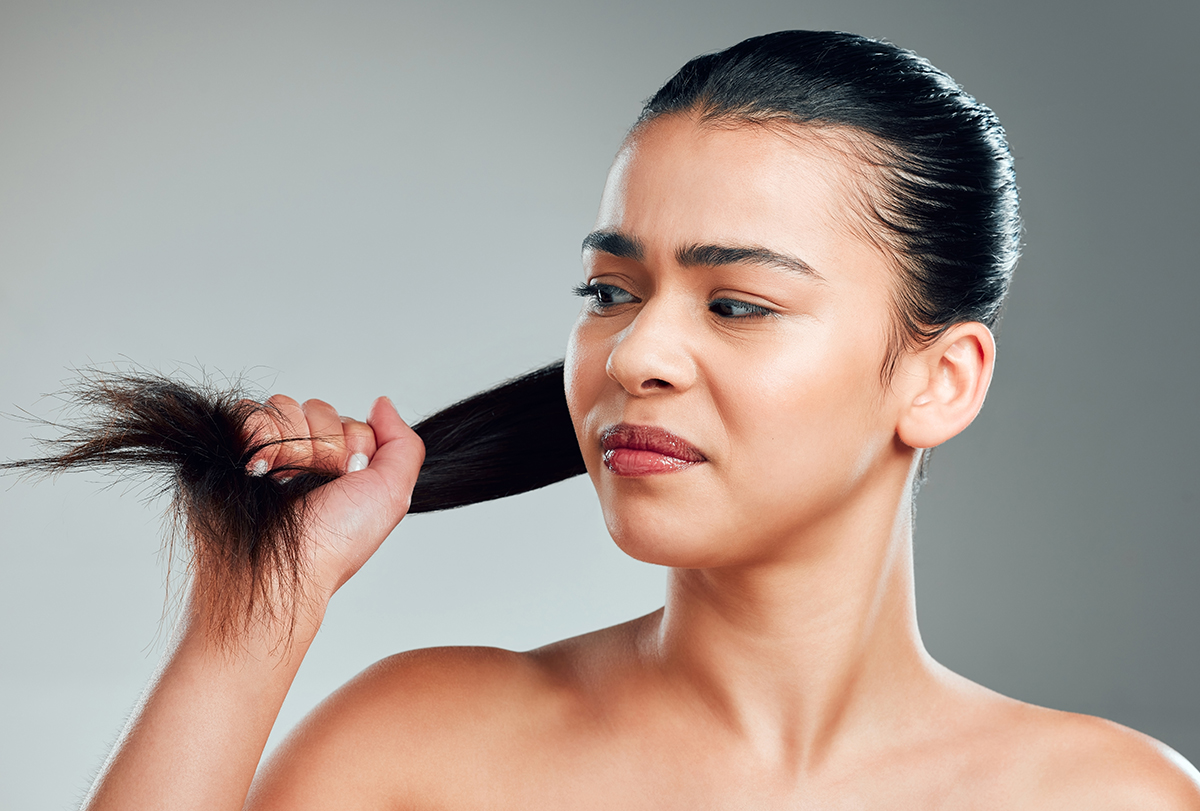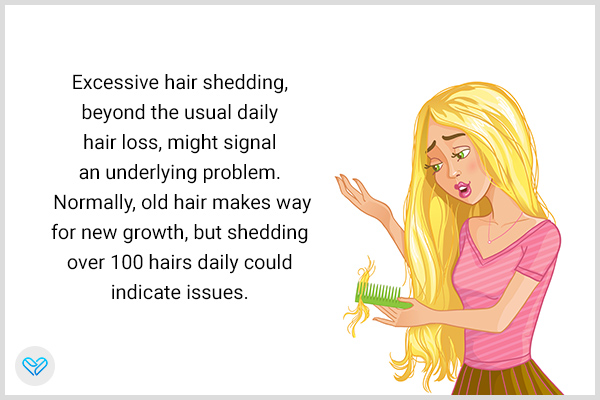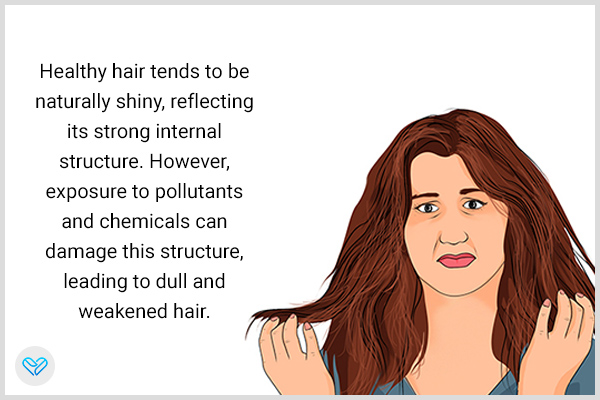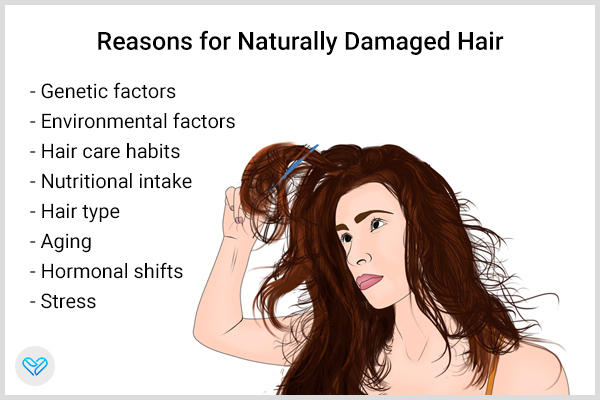In this article:
Your hair is an integral part of your unique identity, and making sure it appears and feels healthy and vibrant is a journey worth taking.

Therefore, it is important to know the signs of and reasons for naturally damaged hair to determine practical solutions.
By knowing your locks and taking good care of your hair, you can restore and preserve its natural beauty.
Remember, your hair can be a reflection of your well-being and can influence your confidence, and it deserves the very best care you can offer.
Read on to learn more.
Signs That Your Hair Is Naturally Damaged
Here are some signs that your hair is naturally damaged.
1. Split ends
Nature has its way of protecting your hair with a natural outer layer covering the hair cuticle. When this layer is damaged, it opens the door to the dreaded split ends.
These split ends are essentially hair strands that split into two or more sections toward the tips, causing your hair to appear messy and be prone to breakage. (1)
2. Uncontrolled hair fall

Excessive hair shedding, beyond the usual daily hair loss, might signal an underlying problem. Normally, old hair makes way for new growth, but shedding over 100 hairs daily could indicate issues. (2)(3)
Uncontrolled hair fall is often linked to health conditions such as thyroid disorders, polycystic ovarian disease (PCOD), and alopecia. (4)(5)
3. Dandruff
Dandruff, a familiar problem, occurs when your scalp’s natural oil balance goes awry. Whether your hair tends to be oily or a bit dry, dandruff can be a bothersome outcome, and that’s not great news for your hair. (6)(7)
Dandruff shows up as pesky flakes and an itchy scalp. It can also clog your scalp with dead skin cells, creating barriers to your hair’s growth and overall well-being. (8)
4. Frizziness
Frizz typically emerges when your hair is dry and damaged, and it’s a sign you shouldn’t ignore. Excessive frizz is a clear indicator of hair health issues.
Today, the trend of frequent styling with heat tools and chemical-laden products has led many down the frizz path.
However, some people have natural frizziness. (9)(10)
5. Dullness

Healthy hair tends to be naturally shiny, reflecting its strong internal structure. However, exposure to pollutants and chemicals can damage this structure, leading to dull and weakened hair.
However, some people have naturally dull hair. (11)
Reasons for Naturally Damaged Hair
Experts share the following reasons why you may have naturally damaged hair.
1. Genetic factors
It all starts with your genes. Your unique genetic makeup can make your hair more susceptible to damage. This means you need to pay extra attention to its care.
2. Environmental factors
The world around you matters too. Sun, pollution, and other environmental factors can weaken your hair over time, underlining the need for protective measures.
3. Hair care habits
How you treat your hair daily plays a big role. Overdoing the use of hot styling tools, using harsh products, and aggressive brushing can all lead to damage.
4. Nutritional intake
What you eat matters for your hair. If your diet lacks essential nutrients, your hair becomes more vulnerable to damage.
5. Hair type
Different hair types have different levels of resilience. For example, fine and curly hair can be more delicate.

6. Aging
As you get older, your hair naturally becomes more prone to damage due to changes in texture and oil production.
7. Hormonal shifts
Hormonal changes during pregnancy, menopause, or other life phases can impact hair health.
8. Stress
High stress levels can take a toll on your hair, making it more vulnerable to damage.
Solutions for Naturally Damaged Hair
Here are some quick remedial solutions for naturally damaged hair:
- If you’re dealing with too much hair fall, try hot oil massages using oils such as amla oil, olive oil, argan oil, and coconut oil. These massages boost blood flow to your hair follicles, providing your scalp with the nutrients and oxygen it needs. (12)
- To fight split ends, turn to the natural goodness of coconut oil. It is rich in fatty acids and easily nourishes your hair, preventing those pesky split ends. (13)(14)
- Tame frizz with a homemade mask of yogurt and honey. Both ingredients are excellent at hydrating and deeply conditioning your hair. Just mix 4 tablespoons of yogurt with 1 tablespoon of honey to create a hair mask. (15)
- Bring life back to dull hair with an egg mask. Eggs are a fantastic natural choice for nourishing your hair and giving it a healthy shine. (16)
- If dandruff is bothering you, consider massaging a mix of tea tree oil and coconut oil into your scalp. Tea tree oil’s antimicrobial properties can help combat dandruff. (17)
Most-Asked Questions
Can genetics impact my hair’s health?
Yes, your genes play a role in how prone your hair is to damage.
What common habits harm my hair?
Overusing hot tools, harsh products, and aggressive brushing
Does getting older affect hair damage?
Yes, as you age, your hair can become more vulnerable to damage
Final Word
Maintaining healthy and vibrant hair is crucial for your overall well-being and confidence.
This article highlights common signs of naturally damaged hair, including issues such as excessive hair fall, split ends, dandruff, frizz, and dullness. It also offers practical solutions, such as hot oil massages and using natural remedies including coconut oil.
Additionally, it explores various factors that can contribute to hair damage, including genetics, environment, and stress.
- Was this article helpful?
- YES, THANKS!NOT REALLY


